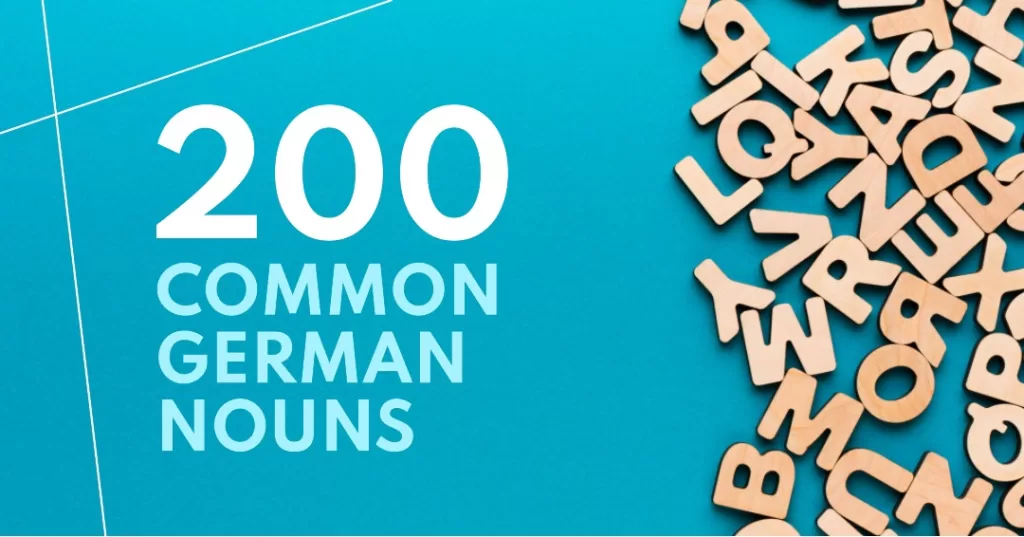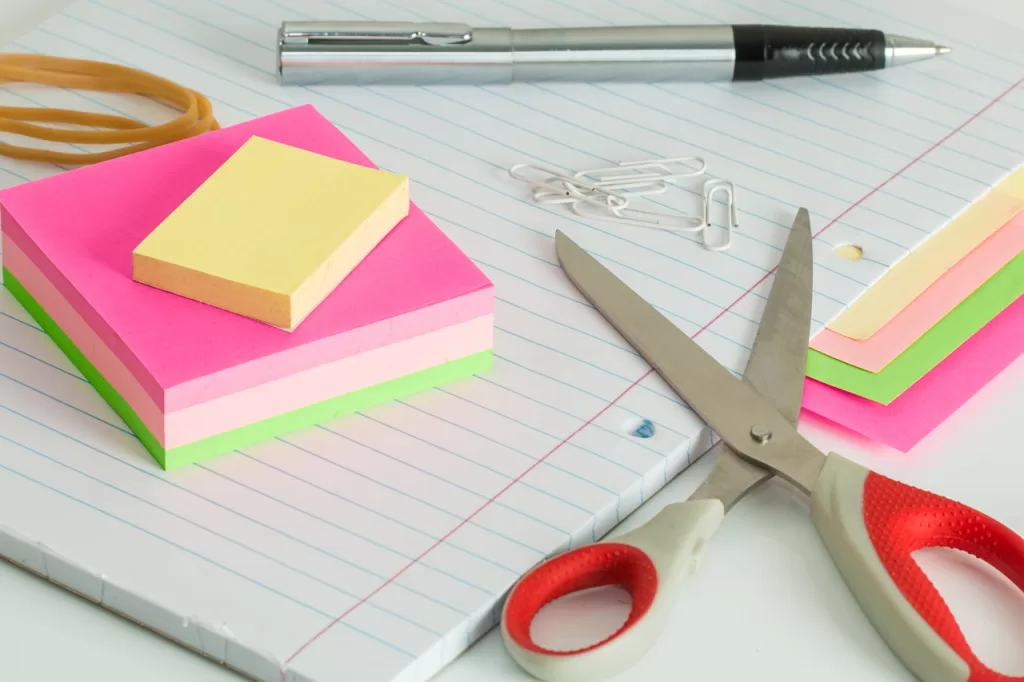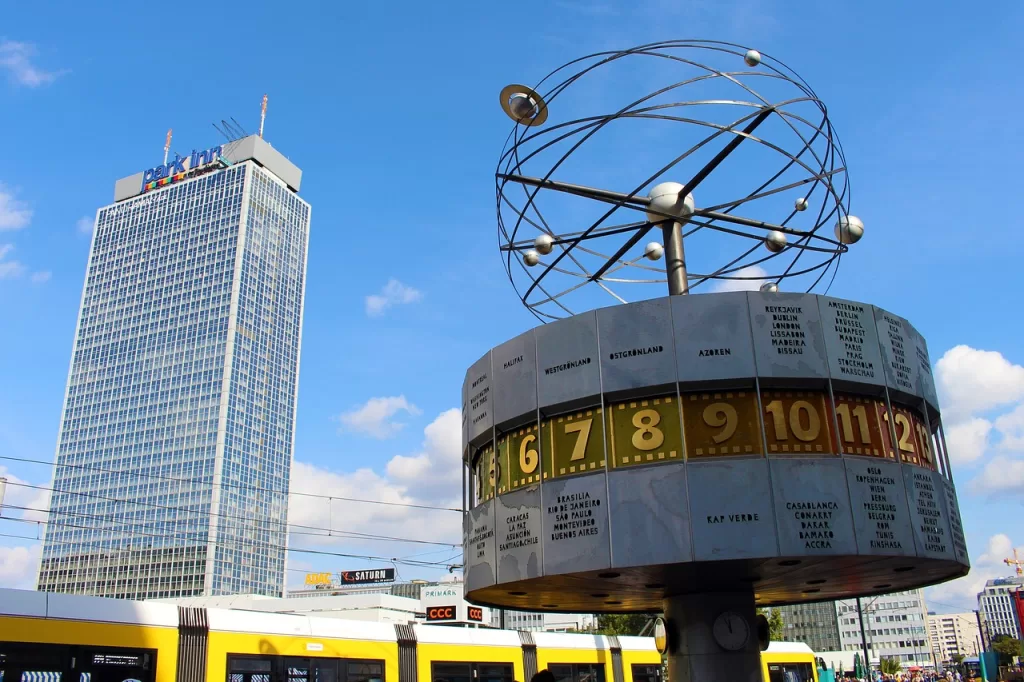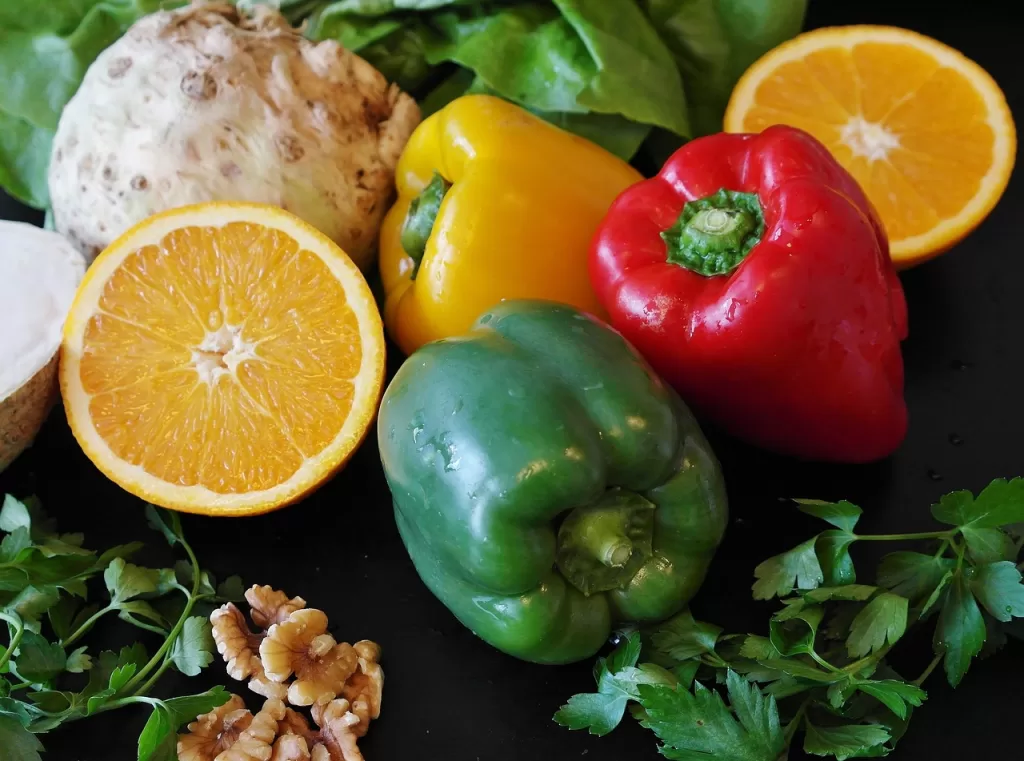
Learning common German nouns is essential for building a strong foundation in the language. In this article, we will explore 200 frequently used German nouns across various categories. By familiarizing yourself with these nouns, you’ll be better equipped to express yourself and engage in meaningful conversations in German.
Keep in mind to always memorize nouns with their correct gender and plural form, since these can be somewhat random. You can also download this list as PDF for easy reference.
I. People and Relationships
A. Family Members
Family plays a vital role in our lives, and knowing the German words for family members is crucial for communication. Here are a few examples:
- der Bruder/die Brüder (the brother/s) – Mein Bruder ist jünger als ich. (My brother is younger than me.)
- die Schwester/die Schwestern (the sister/s) – Meine Schwester lebt in Berlin. (My sister lives in Berlin.)
- der Onkel/die Onkel (the uncle/s) – Mein Onkel kommt zu Besuch am Wochenende. (My uncle is coming to visit this weekend.)
- die Tante/die Tanten (the aunt/s) – Meine Tante ist eine talentierte Köchin. (My aunt is a talented cook.)
- der Großvater/die Großväter (the grandfather/s) – Mein Großvater erzählt gerne Geschichten aus der Vergangenheit. (My grandfather enjoys telling stories from the past.)
- die Großmutter/die Großmütter (the grandmother/s) – Meine Großmutter backt die besten Kuchen. (My grandmother bakes the best cakes.)
- der Cousin/die Cousins (the cousin/s) [male] – Mein Cousin ist ein Jahr älter als ich. (My cousin is one year older than me.)
- die Cousine/die Cousinen (the cousin/s) [female] – Meine Cousine und ich sind beste Freundinnen. (My cousin and I are best friends.)
- der Neffe/die Neffen (the nephew/s) – Mein Neffe hat gestern Geburtstag gehabt. (My nephew had his birthday yesterday.)
- die Nichte/die Nichten (the niece/s) – Meine Nichte ist sehr talentiert in der Kunst. (My niece is very talented in art.)
B. Occupations
Knowing how to talk about different professions in German is essential for discussions about work and careers. (Note: Female occupations will often have an -in ending.) Here are a few examples:
- der Arzt/die Ärzte (the doctor/s) – Mein Bruder ist Arzt im Krankenhaus. (My brother is a doctor at the hospital.)
- der Lehrer/die Lehrer (the teacher/s) – Meine Schwester ist Lehrerin an einer Schule. (My sister is a teacher at a school.)
- der Ingenieur/die Ingenieure (the engineer/s) – Mein Vater arbeitet als Ingenieur in einer Firma. (My father works as an engineer in a company.)
- der Anwalt/die Anwälte (the lawyer/s) – Der Anwalt vertritt mich vor Gericht. (The lawyer represents me in court.)
- der Koch/die Köche (the chef/s) – Der Koch bereitet köstliche Gerichte zu. (The chef prepares delicious dishes.)
- der Musiker/die Musiker (the musician/s) – Mein beste Freund ist Musiker in einer Band. (My best friend is a musician in a band.)
- der Polizist/die Polizisten (the police officer/s) – Der Polizist sorgt für Sicherheit und Ordnung in der Stadt. (The police officer ensures safety and order in the city.)
- der Feuerwehrmann/die Feuerwehrmänner (the firefighter/s) – Der Feuerwehrmann riskiert sein Leben, um Brände zu löschen und Menschen zu retten. (The firefighter risks his life to extinguish fires and rescue people.)
- der Pilot/die Piloten (the pilot/s) – Der Pilot steuert das Flugzeug und sorgt für eine sichere Reise. (The pilot flies the aircraft and ensures a safe journey.)
- der Journalist/die Journalisten (the journalist/s) – Der Journalist berichtet über aktuelle Nachrichten und Ereignisse. (The journalist reports on current news and events.)
- der Schauspieler/die Schauspieler (the actor/s) – Der Schauspieler spielt verschiedene Rollen in Filmen und Theaterstücken. (The actor portrays various characters in movies and plays.)
- der Architekt/die Architekten (the architect/s) – Der Architekt entwirft Gebäude und strukturiert den Stadtraum. (The architect designs buildings and structures urban spaces.)
- der Wissenschaftler/die Wissenschaftler (the scientist/s) – Der Wissenschaftler führt Forschungsexperimente durch und macht neue Entdeckungen. (The scientist conducts research experiments and makes new discoveries.)
- der Fotograf/die Fotografen (the photographer/s) – Der Fotograf erfasst Momente und erstellt beeindruckende Bilder. (The photographer captures moments and creates impressive images.)
- der Mechaniker/die Mechaniker (the mechanic/s) – Der Mechaniker repariert Fahrzeuge und hält sie in gutem Zustand. (The mechanic repairs vehicles and keeps them in good condition.)
- der Banker/die Banker (the banker/s) – Der Banker verwaltet Finanzen und bietet Bankdienstleistungen an. (The banker manage finances and provides banking services.)
C. Personal Relationships
Being able to describe personal relationships is important for conversations and storytelling. Here are a few examples:
- der Freund/die Freunde (the friend/s) – Ich treffe mich heute mit meinem Freund. (I’m meeting up with my friend today.)
- der Partner/die Partner (the partner/s) – Mein Partner und ich sind seit fünf Jahren zusammen. (My partner and I have been together for five years.)
- der Nachbar/die Nachbarn (the neighbor/s) – Mein Nachbar hilft mir immer, wenn ich Probleme habe. (My neighbor always helps me when I have problems.)
- der Kollege/die Kollegen (the colleague/s) – Mein Kollege ist sehr nett und hilfsbereit. (My colleague is very kind and helpful.)
- der Bekannte/die Bekannten (the acquaintance/s) – Ich habe einen alten Bekannten auf der Party getroffen. (I met an old acquaintance at the party.)
- der Chef/die Chefs (the boss/es) – Mein Chef ist sehr streng, aber gerecht. (My boss is strict but fair.)
- der Mitbewohner/die Mitbewohner (the roommate/s) – Mein Mitbewohner und ich teilen uns eine Wohnung. (My roommate and I share an apartment.)
- der Mentor/die Mentoren (the mentor/s) – Mein Mentor hat mir sehr bei meiner beruflichen Entwicklung geholfen. (My mentor has been very helpful in my professional development.)
- der Klassenkamerad/die Klassenkameraden (the classmate/s) – Mein Klassenkamerad und ich arbeiten gut im Team zusammen. (My classmate and I work well together as a team.)
- der Vorgesetzte/die Vorgesetzten (the supervisor/s) – Mein Vorgesetzter gibt mir wertvolle Anleitung und Unterstützung. (My supervisor provides valuable guidance and support.)
For the next section where we’ll explore places and locations with common German nouns.

II. Places and Locations
A. Cities and Towns
Knowing the names of cities and towns in German is essential for talking about travel or discussing specific locations. Here are a few common nouns used to refer to cities and towns:
- die Stadt/die Städte (the city/cities) – Die Stadt hat viele historische Gebäude und Sehenswürdigkeiten. (The city has many historical buildings and landmarks.)
- die Gemeinde/die Gemeinden (the municipality/s) – Die Gemeinde liegt malerisch am Ufer des Flusses. (The municipality is situated beautifully along the riverbank.)
- die Metropole/die Metropolen (the metropolis/s) – Die Metropole bietet eine Vielzahl von kulturellen Aktivitäten und Möglichkeiten. (The metropolis offers a variety of cultural activities and opportunities.)
- der Ort/die Orte (the place or village/s) – Der Ort hat einen charmanten Marktplatz und gemütliche Cafés. (The place/village has a charming marketplace and cozy cafes.)
- die Siedlung/die Siedlungen (the settlement/settlements) – Die Siedlung wurde vor vielen Jahrhunderten gegründet und hat eine reiche Geschichte. (The settlement was founded many centuries ago and has a rich history.)
- das Dorf/die Dörfer (the village/s) – Das Dorf liegt abgeschieden inmitten von grünen Feldern und Wäldern. (The village is secluded amidst green fields and forests.)
- die Hauptstadt/die Hauptstädte (the capital/s) – Die Hauptstadt von Deutschland ist Berlin. (The capital of Germany is Berlin.)
B. Public Places
Understanding common German nouns related to public places enables you to navigate and describe your surroundings. Here are a few common nouns used to refer to public places:
- das Museum/die Museen (the museum/s) – Das Museum zeigt eine beeindruckende Sammlung von Kunstwerken. (The museum showcases an impressive collection of artworks.)
- das Theater/die Theater (the theater/s) – Das Theater bietet eine Vielzahl von Vorstellungen und Aufführungen. (The theater offers a variety of shows and performances.)
- das Kino/die Kinos (the cinema/s) – Das Kino zeigt die neuesten Filme aus aller Welt. (The cinema screens the latest films from around the world.)
- das Schwimmbad/die Schwimmbäder (the swimming pool/s) – Das Schwimmbad ist ein beliebter Ort, um sich an heißen Tagen abzukühlen. (The swimming pool is a popular place to cool off on hot.)
- der Park/die Parks (the park/parks) – Der Park ist ein idealer Ort für Spaziergänge und Freizeitaktivitäten. (The park is an ideal place for walks and leisure activities.)
- die Bibliothek/die Bibliotheken (the library/libraries) – Die Bibliothek bietet eine große Auswahl an Büchern und Ressourcen. (The library offers a wide selection of books and resources.)
- das Café/die Cafés (the café/s) – Das Café lädt zu gemütlichen Kaffeepausen und Gesprächen ein. (The café invites you to cozy coffee breaks and conversations.)
- das Restaurant/die Restaurants (the restaurant/s) – Das Restaurant serviert köstliche Gerichte aus verschiedenen Küchen der Welt. (The restaurant serves delicious dishes from various cuisines around the world.)
- das Rathaus/die Rathäuser (the city hall/s) – Das Rathaus von Berlin ist ein bekanntes Wahrzeichen. (The city hall of Berlin is a famous landmark.)

III. Objects and Things
A. Everyday Objects
Knowing the German words for everyday objects is crucial for expressing yourself and understanding your surroundings. Here are a few examples:
- der Tisch/die Tische (the table/s) – Wir setzen uns an den Tisch, um zu essen. (We sit at the table to eat.)
- der Stuhl/die Stühle (the chair/s) – Bitte nehmen Sie auf einem Stuhl Platz. (Please have a seat on a chair.)
- das Buch/die Bücher (the book/s) – Ich lese gerne ein gutes Buch. (I enjoy reading a good book.)
- der Stift/die Stifte (the pen/s) – Kannst du mir einen Stift leihen? (Can you lend me a pen?)
- das Telefon/die Telefone (the phone/s) – Wo ist mein Telefon? (Where is my phone?)
- das Auto/die Autos (the car/s) – Ich fahre mit dem Auto zur Arbeit. (I go to work by car.)
- der Schreibtisch/die Schreibtische (the desk/s) – Ich arbeite an meinem Schreibtisch. (I work at my desk.)
- der Schrank/die Schränke (the cabinet/s) – Ich bewahre meine Kleidung im Schrank auf. (I store my clothes in the cabinet.)
- das Bett/die Betten (the bed/s) – Ich schlafe gerne in einem gemütlichen Bett. (I enjoy sleeping in a comfortable bed.)
- der Fernseher/die Fernseher (the television/s) – Wir schauen gerne Filme auf dem Fernseher. (We enjoy watching movies on the television.)
- der Laptop/die Laptops (the laptop/s) – Ich arbeite mit meinem Laptop von überall aus. (I work with my laptop from anywhere.)
- der Teller/die Teller (the plate/s) – Das Essen liegt auf dem Teller. (The food is on the plate.)
- die Tasse/die Tassen (the cup/s) – Ich trinke meinen Kaffee aus einer Tasse. (I drink my coffee from a cup.)
- das Glas/die Gläser (the glass/es) – Das Getränk ist in einem Glas. (The drink is in a glass.)
- der Löffel/die Löffel (the spoon/s) – Ich rühre meine Suppe mit einem Löffel um. (I stir my soup with a spoon.)
- die Gabel/die Gabeln (the fork/s) – Ich esse mein Essen mit einer Gabel. (I eat my food with a fork.)
B. Food and Drinks
Food is a universal topic, and knowing the German names for common food and drinks is essential for conversations and ordering in restaurants. Here are a few examples:
- das Brot/die Brote (the bread/s) – Ich esse gerne frisches Brot zum Frühstück. (I enjoy eating fresh bread for breakfast.)
- der Kaffee/die Kaffees (the coffee/s) – Kannst du mir bitte einen Kaffee bringen? (Can you please bring me a coffee?)
- der Käse/die Käse (the cheese/s) – Dieser Käse schmeckt köstlich. (This cheese tastes delicious.)
- die Wurst/die Würste (sausage/s) – In Deutschland gibt es viele Sorten von Wurst. (In Germany there are many types of sausage.)
- der Salat/die Salate (the salad/s) – Ich esse gerne einen frischen Salat zum Mittagessen. (I enjoy eating a fresh salad for lunch.)
- das Bier/die Biere (the beer/s) – In Deutschland trinken viele Menschen gerne Bier. (In Germany, many people enjoy drinking beer.)
- die Suppe/die Suppen (the soup/s) – An einem kalten Tag wärmt eine heiße Suppe. (On a cold day, a hot soup warms you up.)
- das Fleisch/die Fleisch (the meat/s) – Einige Menschen essen gerne Fleisch, andere bevorzugen vegetarische Alternativen. (Some people enjoy eating meat, while others prefer vegetarian alternatives.)
- der Reis (rice) [no plural] – Reis ist eine häufige Beilage in vielen Gerichten. (Rice is a common side dish in many dishes.)
- die Nudel/die Nudeln (the noodle/s) – Nudeln mit Tomatensauce und Parmesan ist ein klassisches Gericht. (Pasta with tomato sauce and Parmesan cheese is a classic dish.)
- das Gemüse (the vegetable) [no plural] – Eine ausgewogene Ernährung sollte ausreichend Gemüse enthalten. (A balanced diet should include an adequate amount of vegetables.)
- das Obst (the fruit) [no plural] – Obst ist eine gesunde Snack-Option. (Fruit is a healthy snack option.)
- das Wasser (the water) [no plural] – Trinkst du genug Wasser? (Are you drinking enough water?)
C. Animals and Pets
Animals and pets are a common topic of conversation. Knowing the German names for different animals allows you to engage in discussions and express your love for pets. Here are a few examples:
- der Hund/die Hunde (the dog/s) – Mein Hund liebt es, spazieren zu gehen. (My dog loves to go for walks.)
- die Katze/die Katzen (the cat/s) – Meine Schwester hat eine süße Katze als Haustier. (My sister has an adorable cat as a pet.)
- das Pferd/die Pferde (the horse/s) – Reitest du gerne auf einem Pferd? (Do you enjoy riding a horse?)
- der Vogel/die Vögel (the bird/s) – Die Vögel zwitschern fröhlich im Garten. (The birds are chirping happily in the garden.)
- das Kaninchen/die Kaninchen (the rabbit/s) – Meine Tochter hat ein flauschiges Kaninchen als Haustier. (My daughter has a fluffy rabbit as a pet.)
- der Fisch/die Fische (the fish/fish) – In diesem See gibt es viele bunte Fische. (There are many colorful fish in this lake.)
- die Maus/die Mäuse (the mouse/mice) – In meinem Haus ist eine Maus, ich muss sie loswerden. (There is a mouse in my house, I need to get rid of it.)
- der Hamster/die Hamster (the hamster/s) – Mein kleiner Bruder hat einen niedlichen Hamster als Haustier. (My little brother has an adorable hamster as a pet.)
- die Schlange/die Schlangen (the snake/s) – Ich habe eine Phobie vor Schlangen, sie machen mir Angst. (I have a phobia of snakes, they scare me.)
- die Schildkröte/die Schildkröten (the turtle/s) – Schildkröten sind langsame, aber faszinierende Tiere. (Turtles are slow but fascinating creatures.)
- das Meerschweinchen/die Meerschweinchen (the guinea pig/s) – Meerschweinchen sind niedliche Haustiere, die gerne Gras fressen. (Guinea pigs are cute pets that enjoy eating grass.)
- das Huhn/die Hühner (the chicken/s) – Meine Großeltern haben Hühner auf ihrem Bauernhof. (My grandparents have chickens on their farm.)
- der Löwe/die Löwen (the lion/s) – Löwen sind majestätische Tiere und Könige der Savanne. (Lions are majestic animals and kings of the savannah.)
- der Elefant/die Elefanten (the elephant/s) – Elefanten sind beeindruckende und intelligente Tiere mit großen Stoßzähnen. (Elephants are impressive and intelligent animals with large tusks.)
- das Känguru/die Kängurus (the kangaroo/s) – Kängurus sind bekannt für ihre starken Hinterbeine und das Hüpfen. (Kangaroos are known for their powerful hind legs and hopping.)
In the next section, we will explore time and seasons with common German nouns, allowing you to discuss schedules, dates, and the passing of time effectively.

IV. Time and Seasons
A. Days of the Week
Knowing the German names for the days of the week is essential for scheduling appointments, planning activities, and discussing weekly routines. These are all masculine and the plural is always -e, so we won’t list these separately.
- der Montag (Monday) – Wir haben eine Besprechung am Montag. (We have a meeting on Monday.)
- der Dienstag (Tuesday) – Am Dienstag gehe ich zum Deutschkurs. (On Tuesday, I go to German class.)
- der Mittwoch (Wednesday) – Mittwoch ist mein freier Tag. (Wednesday is my day off.)
- der Donnerstag (Thursday) – Am Donnerstag gehe ich ins Kino. (I go to the movies on Thursday.)
- der Freitag (Friday) – Freitag ist mein Lieblingstag der Woche. (Friday is my favorite day of the week.)
- der Samstag (Saturday) – Am Samstag gehe ich zum Sport. (I go to exercise on Saturday morning.)
- der Sonntag (Sunday) – Am Sonntag werde ich ausschlafen. (On Sunday I’ll sleep in.)
B. Months of the Year
Knowing the German names for the months of the year allows you to discuss dates, seasons, and special occasions. These are pretty easy to learn, since they are a) all in masculine and b) mostly the same as in English, with minor spelling variations:
- der Januar (January)
- der Februar (February)
- der März (March)
- der April (April)
- der Juni (June)
- der Juli (July)
- der August (August)
- der September (September)
- der Oktober (October)
- der November (November)
- der Dezember (December)
C. Seasons
Understanding the German names for seasons allows you to discuss weather, activities, and preferences related to different times of the year. Here are a few examples:
- der Frühling (Spring) – Im Frühling blühen die Bäume und die Tage werden länger. (In spring, the trees bloom, and the days get longer.)
- der Sommer (Summer) – Im Sommer gehe ich gerne schwimmen. (I enjoy swimming in summer.)
- der Herbst (Autumn/Fall) – Im Herbst verfärben sich die Blätter. (The leaves change color in autumn.)
- der Winter (Winter) – Im Winter fällt oft Schnee, und es ist kalt. (It often snows and is cold in winter.)
By expanding your vocabulary with common German nouns related to time and seasons, you’ll be able to express yourself more accurately and engage in conversations about dates, events, and the passing of time.
In the next section, we will cover various health-related topics, including body parts, illnesses and medical professions, which will further enrich your German vocabulary.
V. Health
A. Body Parts
Knowing the German nouns for body parts allows you to communicate about health, describe symptoms, and discuss medical conditions. Here are a few common nouns:
- der Kopf/die Köpfe (the head/s) – Mein Kopf schmerzt. (My head hurts.)
- der Bauch/die Bäuche (the stomach/s) – Mein Bauch tut weh. (My stomach hurts.)
- die Hand/die Hände (the hand/s) – Ich habe mir in die Hand geschnitten. (I cut my hand.)
- das Bein/die Beine (the leg/s) – Ich habe mir das Bein gebrochen. (I broke my leg.)
- der Rücken/die Rücken (the back/s) – Mein Rücken schmerzt. (My back is hurting.)
- das Herz/die Herzen (the heart/s) – Mein Herz schlägt schnell. (My heart is beating fast.)
- der Arm/die Arme (the arm/s) – Ich habe mir den Arm verstaucht. (I sprained my arm.)
- das Knie/die Knie (the knee/s) – Mein Knie tut weh, ich kann kaum laufen. (My knee hurts, I can hardly walk.)
- der Fuß/die Füße (the foot/feet) – Ich habe mir den Fuß verstaucht und kann nicht gut laufen. (I sprained my foot and can’t walk properly.)
- das Auge/die Augen (the eye/s) – Mein Auge ist rot und juckt. (My eye is red and itchy.)
- die Nase/die Nasen (the nose/s) – Meine Nase ist verstopft, ich kann nicht richtig atmen. (My nose is congested, I can’t breathe properly.)
- das Ohr/die Ohren (the ear/s) – Mein Ohr tut weh, ich glaube, ich habe eine Infektion. (My ear hurts, I think I have an infection.)
- der Mund/die Münder (the mouth/s) – Mein Mund ist trocken, ich brauche etwas zu trinken. (My mouth is dry, I need something to drink.)
- die Schulter/die Schultern (the shoulder/s) – Meine Schulter ist steif und schmerzt. (My shoulder is stiff and painful.)
- der Hals/die Hälse (the neck/s) – Mein Hals ist verspannt, ich brauche eine Massage. (My neck is tense, I need a massage.)
- der Finger/die Finger (the finger/s) – Ich habe mir den Finger eingeklemmt, es tut sehr weh. (I trapped my finger, it hurts a lot.)
B. Illnesses and Symptoms
Expanding your vocabulary with German nouns related to illnesses and symptoms allows you to discuss health conditions and seek medical assistance. Here are a few common nouns:
- die Grippe/die Grippen (the flu/s) – Ich habe die Grippe und fühle mich schwach. (I have the flu and feel weak.)
- der Husten (the cough) [no plural] – Ich habe einen starken Husten. (I have a severe cough.)
- das Fieber/die Fieber (the fever/s) – Ich habe hohes Fieber. (I have a high fever.)
- der Schmerz/die Schmerzen (the pain/s) – Ich habe einen stechenden Schmerz in meinem Arm. (I have a piercing pain in my arm.)
- die Erkältung/die Erkältungen (the cold/s) – Ich habe eine Erkältung mit laufender Nase. (I have a cold with a runny nose.)
- die Müdigkeit (the fatigue) [no plural] – Ich leide unter starker Müdigkeit. (I suffer from severe fatigue.)
C. Medical Professionals
Knowing the German nouns for medical professionals enables you to discuss healthcare providers and seek appropriate medical assistance. Here are a few common nouns:
- die Krankenschwester/die Krankenschwestern (the nurse/nurses) – Die Krankenschwester kümmert sich um die Patienten im Krankenhaus. (The nurse takes care of the patients in the hospital.)
- der Chirurg/die Chirurgen (the surgeon/s) – Der Chirurg führen Operationen durch. (The surgeon performs surgeries.)
- der Zahnarzt/die Zahnärzte (the dentist/s) – Die Zahnärzte kümmern sich um die Zahngesundheit der Patienten. (The dentists take care of the dental health of patients.)
- der Apotheker/die Apotheker (the pharmacist/s) – Der Apotheker gibt den Patienten die benötigten Medikamente. (The pharmacist provides patients with the necessary medications.)
- der Physiotherapeut/die Physiotherapeuten (the physiotherapist/s) – Die Physiotherapeuten helfen bei der Rehabilitation von Verletzungen. (The physiotherapists assist in the rehabilitation of injuries.)
Expanding your vocabulary with common German nouns related to health empowers you to discuss medical matters, describe symptoms accurately, and seek appropriate healthcare when needed.

VI. Fruit and Vegetables
A. Fruit
Knowing the German nouns for different fruits allows you to discuss dietary choices, recipes, and flavors. Here are a few common nouns:
- der Apfel/die Äpfel (the apple/apples) – Ein Apfel am Tag hält den Arzt fern. (An apple a day keeps the doctor away.)
- die Banane/die Bananen (the banana/s) – Bananen sind reich an Kalium und eine gute Energiequelle. (Bananas are rich in potassium and a good source of energy.)
- die Orange/die Orangen (the orange/s) – Orangen enthalten viel Vitamin C. (Oranges are high in vitamin C.)
- die Erdbeere/die Erdbeeren (the strawberry/strawberries) – Ich liebe den süßen Geschmack von Erdbeeren. (I love the sweet taste of strawberries.)
- die Traube/die Trauben (the grape/s) – Die Trauben sind saftig und erfrischend. (The grapes are juicy and refreshing.)
- die Birne/die Birnen (the pear/s) – Birnen sind reif, wenn sie weich werden. (Pears are ripe when they become soft.)
- die Kirsche/die Kirschen (the cherry/cherries) – Die Kirschen sind reif und schmackhaft. (The cherries are ripe and tasty.)
- die Wassermelone/die Wassermelonen (the watermelon/s) – An einem heißen Tag genieße ich eine saftige Wassermelone. (On a hot day, I enjoy a juicy watermelon.)
- die Ananas/die Ananas (the pineapple/s) – Eine Ananas ist eine exotische Frucht mit süßem Geschmack. (A pineapple is an exotic fruit with a sweet taste.)
- die Mango/die Mangos (the mango/s) – Mangos sind köstlich und haben eine saftige Textur. (Mangos are delicious and have a juicy texture.)
- die Himbeere/die Himbeeren (the raspberry/raspberries) – Himbeeren sind klein, aber voller Geschmack. (Raspberries are small but full of flavor.)
- die Blaubeere/die Blaubeeren (the blueberry/blueberries) – Blaubeeren sind reich an Antioxidantien und haben eine intensive Farbe. (Blueberries are rich in antioxidants and have a vibrant color.)
- die Kiwi/die Kiwis (the kiwi/s) – Kiwis sind saftig und haben einen erfrischenden Geschmack. (Kiwis are juicy and have a refreshing taste.)
- die Pfirsich/die Pfirsiche (the peach/peaches) – Pfirsiche sind süß und saftig, perfekt für den Sommer. (Peaches are sweet and juicy, perfect for the summer.)
- die Pflaume/die Pflaumen (the plum/s) – Pflaumen sind süß und leicht sauer im Geschmack. (Plums are sweet and slightly sour in taste.)
- die Zitrone/die Zitronen (the lemon/s) – Zitronen haben einen erfrischenden und sauren Geschmack. (Lemons have a refreshing and sour taste.)
B. Vegetables
Expanding your vocabulary with German nouns for different vegetables allows you to discuss dietary preferences, cooking methods, and nutritional benefits. Here are a few common nouns:
- die Karotte/die Karotten (the carrot/s) – Karotten sind reich an Vitamin A. (Carrots are rich in vitamin A.)
- die Tomate/die Tomaten (the tomato/es) – Tomaten sind vielseitig in der Küche einsetzbar. (Tomatoes are versatile in the kitchen.)
- die Zwiebel/die Zwiebeln (the onion/s) – Zwiebeln verleihen vielen Gerichten Geschmack. (Onions add flavor to many dishes.)
- der Spinat/die Spinate (the spinach/es) – Spinat ist reich an Eisen und Mineralstoffen. (Spinach is rich in iron and minerals.)
- der Brokkoli (the broccoli) – Brokkoli enthält viele gesunde Nährstoffe. (Broccoli contains many healthy nutrients.)
- die Kartoffel/die Kartoffeln (the potato/potatoes) – Kartoffeln sind eine beliebte Beilage in vielen Gerichten. (Potatoes are a popular side dish in many meals.)
- die Gurke/die Gurken (the cucumber/s) – Gurken sind erfrischend und haben einen hohen Wassergehalt. (Cucumbers are refreshing and have a high water content.)
- der Paprika/die Paprikas (the bell pepper/s) – Paprika gibt Gerichten eine angenehme Schärfe und Farbe. (Bell peppers add a pleasant spiciness and color to dishes.)
- der Kohl/die Kohle (the cabbage/s) – Kohl ist reich an Vitamin C und Ballaststoffen. (Cabbage is rich in vitamin C and fiber.)
- die Zucchini/die Zucchinis (the zucchini/s) – Zucchini eignen sich hervorragend zum Braten oder Grillen. (Zucchinis are great for frying or grilling.)
- der Kürbis/die Kürbisse (the pumpkin/s) – Kürbisse werden oft für herzhafte Suppen oder süße Desserts verwendet. (Pumpkins are often used for savory soups or sweet desserts.)
Expanding your vocabulary with common German nouns related to fruits and vegetables enables you to discuss dietary choices, recipes, and flavors, while also promoting a healthy lifestyle.

VII. Shopping
A. Stores and Shops
Knowing the German nouns for different types of stores and shops allows you to navigate shopping centers, discuss shopping preferences, and ask for directions. Here are a few common nouns:
- der Supermarkt/die Supermärkte (the supermarket/s) – In den Supermärkten kann man Lebensmittel und Haushaltsartikel kaufen. (You can buy groceries and household items at the supermarkets.)
- das Kaufhaus/die Kaufhäuser (the department store/s) – In einem Kaufhaus findet man eine große Auswahl an Kleidung und Haushaltswaren. (The department store offers a wide range of clothing and household goods.)
- die Buchhandlung/die Buchhandlungen (the bookstore/s) – In den Buchhandlungen gibt es eine Vielzahl von Büchern und Zeitschriften. (The bookstores have a variety of books and magazines.)
- der Elektronikladen/die Elektronikläden (the electronics store/s) – In den Elektronikläden findet man Computer, Handys und andere elektronische Geräte. (The electronics stores sell computers, cell phones, and other electronic devices.)
- der Schuhladen/die Schuhläden (the shoe store/s) – In einem Schuhladen gibt es eine große Auswahl an Schuhen für Damen, Herren und Kinder. (The shoe store has a wide selection of shoes for women, men, and children.)
- die Apotheke/die Apotheken (the pharmacy/pharmacies) – In den Apotheken kann man Medikamente und Gesundheitsprodukte kaufen. (You can buy medications and health products at the pharmacies.)
- der Lebensmittelladen/die Lebensmittelläden (the grocery store/s) – In den Lebensmittelläden findet man eine große Auswahl an frischen Lebensmitteln. (The grocery stores offer a wide range of fresh food items.)
- die Drogerie/die Drogerien (the drugstore/s) – In den Drogerien findet man Kosmetikprodukte, Pflegeartikel und Haushaltswaren. (The drugstores have cosmetic products, personal care items, and household goods.)
- der Zoohandlung/die Zoohandlungen (the pet shop/s) – In den Zoohandlungen findet man eine Vielzahl von Haustieren, Futter und Zubehör. (The pet shops offer a variety of pets, food, and accessories.)
- das Optikergeschäft/die Optikergeschäfte (the optician/opticians) – In den Optikergeschäften kann man Brillen und Kontaktlinsen kaufen sowie Sehtests durchführen lassen. (At the opticians, you can purchase glasses and contact lenses, and get vision tests done.)
- die Parfümerie/die Parfümerien (the perfume shop/s) – In der Parfümerie findet man eine große Auswahl an Parfüms, Kosmetik und Pflegeprodukten. (The perfume shop has a wide selection of perfumes, cosmetics, and skincare products.)
- das Haushaltswarengeschäft/die Haushaltswarengeschäfte (the household goods store/s) – In den Haushaltswarengeschäften findet man Utensilien, Küchenzubehör und andere Haushaltsartikel. (The household goods stores offer utensils, kitchen accessories, and other household items.)
- das Blumengeschäft/die Blumengeschäfte (the flower shop/s) – In den Blumengeschäften kann man frische Blumensträuße, Zimmerpflanzen und Dekorationen kaufen. (The flower shops sell fresh flower bouquets, indoor plants, and decorations.)
- der Schmuckladen/die Schmuckläden (the jewelry store/s) – In den Schmuckläden findet man eine Auswahl an Ringen, Halsketten, Armbändern und anderen Schmuckstücken. (The jewelry stores have a selection of rings, necklaces, bracelets, and other jewelry pieces.)
Note that -laden (masculine) and -geschäft (neuter) can generally be used interchangeably. So you could also say “das Lebensmittelgeschäft” or “der Blumenladen”.
B. Payment and Shopping
Knowing the German nouns for payment methods and common shopping phrases allows you to handle transactions, ask for assistance, and interact with salespersons. Here are a few common nouns:
- das Portemonnaie/die Portemonnaies (the purse/purses) – Sie können Ihre Kreditkarte sicher in Ihrem Portemonnaie aufbewahren. (You can keep your credit card safely in your purse.)
- der Bon/die Bonbons (the receipt/s) – Bitte bewahren Sie den Bon für Ihre Einkäufe auf. (Please keep the receipt for your purchases.)
- die Kasse/die Kassen (the cashier/s) – Sie können Ihre Ware an der Kasse umtauschen. (You can exchange your wares at the cashier.)
- der Kundenservice/die Kundenservices (the customer service/s) – Unser Kundenservice steht Ihnen bei Fragen und Anliegen zur Verfügung. (Our customer service is available to assist you with any questions or concerns.)
- das Sonderangebot/die Sonderangebote (the special offer/s) – Schauen Sie sich unsere aktuellen Sonderangebote an! (Take a look at our current special offers!)
- das Angebot/die Angebote (the offer/s) – Haben Sie ein besonderes Angebot für dieses Produkt? (Do you have a special offer for this product?)
- der Gutschein/die Gutscheine (the voucher/s) – Hier ist ein Gutschein für Ihren nächsten Einkauf. (Here is a voucher for your next purchase.)
- die Zahlungsmethode/die Zahlungsmethoden (the payment method/s) – Wir akzeptieren verschiedene Zahlungsmethoden, einschließlich Kreditkarten und Bargeld. (We accept various payment methods, including credit cards and cash.)
- das Bargeld (the cash) [no plural] – Kann ich mit Bargeld bezahlen? (Can I pay with cash?)
- die Kreditkarte/die Kreditkarten (the credit card/s) – Akzeptieren Sie Kreditkarten? (Do you accept credit cards?)
- die Quittung/die Quittungen (the receipt/s) – Kann ich bitte eine Quittung bekommen? (Can I please have a receipt?)
- die Einkaufstasche/die Einkaufstaschen (the shopping bag/s) – Haben Sie eine Einkaufstasche? (Do you have a shopping bag?)
- der Kundendienst/die Kundendienste (the customer service/s) – Können Sie mir bitte den Kundendienst zeigen? (Can you please show me the customer service?)
- der Rabatt/die Rabatte (the discount/s) – Gibt es einen Rabatt auf dieses Produkt? (Is there a discount on this product?)
Expanding your vocabulary with common German nouns related to shopping empowers you to navigate stores, create shopping lists, discuss shopping preferences, and interact effectively with salespersons. So, whether you’re exploring a supermarket, browsing through clothing stores, or looking for specific items, having a good grasp of shopping-related nouns will enhance your shopping experience.
–
